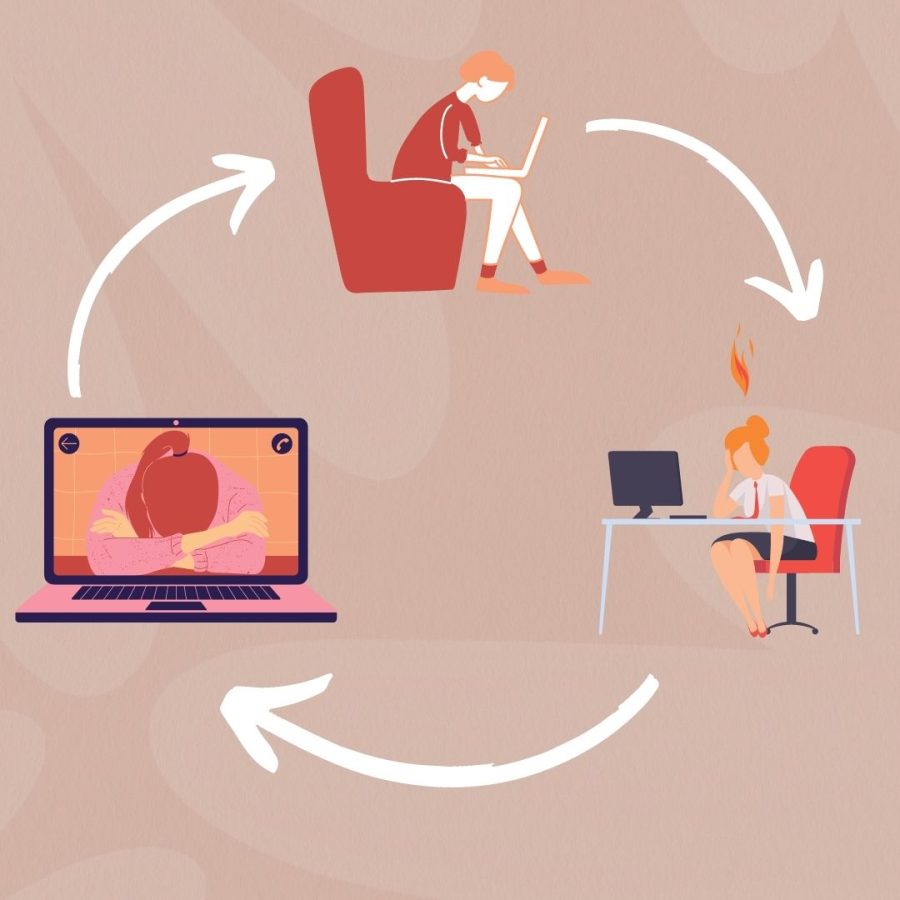Burnt out? Me too. Let’s get through this together
The cycle of “Work, stress, Sleep” is said to accompany feelings of burnout.
April 27, 2022
The final days of the school year are quickly approaching. With only a week until finals begin, the end is visibly close, yet feels impossible to reach.
At least I hope I’m not the only one thinking so. Whether you’re rounding out your first year of college or counting down the minutes until graduation, burnout can hit at any point of your college career. Multiple times, even.
Especially during the spring semester, with nicer days and more sunshine, going to class, turning in assignments and being an involved student somehow drifts to the bottom of a nonexistent to-do list.
I can’t pinpoint why this semester, in particular, brought about amplified exhaustion. UNCA gave the okay to take off our masks and while the pandemic is ongoing, this small return to normalcy, whether you agreed with it or not, felt as if it should be accompanied with a break to process how much COVID-19 affected our individual and campus wide lives these last two years.
In reality, there hasn’t been a normal school year for some time now. Online class from the comfort of your home or social distancing on campus created a disconnect between students and faculty. It’s been harder to meet people, make friends and find a comfortable and positive place within the UNCA community.
The temporary feeling of isolation, lack of interpersonal connection and continuous worrying about individual health and safety has no doubt contributed to the current and overwhelming sweep of burnout across campus.
Whether your burnout is triggered by personal reasons, collective issues or impending doom, remember it’s normal and it’s not permanent. While there isn’t a correct or exact way to bypass the feelings associated with it, steps exist to mitigate burnout symptoms during the final push of the semester.
As everyone from your parents to professors will tell you, sleep is, in fact, important. According to the American Academy of Sleep Medicine, adequate sleep patterns play an essential role in a students’ academic performance.
Not only do restful nights of sleep contribute to good health and overall wellbeing, they also allow the brain essential time to process and solidify information–a particularly important resource when long days translate into late nights of writing, memorizing and researching.
While studying may be the last thing anyone wants to do during a burnout episode, leaving the semester behind knowing you put in the effort to succeed feels infinitely better than walking away with a failing grade or lowered GPA.
Set reasonable goals and expectations for yourself. Fifteen, 20, or 30 minutes of studying for a final exam in a day will always be better than nothing. Intersperse study habits with regular breaks or change up your scenery. If studying in your dorm leads to more distractions, move outside or off-campus.
As hard as it may be, reaching out to professors or peers for extra help in a class is often the best place to start when burnout hits with full force. Making a plan, getting an extension, or sharing notes from missed class sessions all help alleviate impending stressors synonyms with end of the year burnout.
It’s also important to remember your time should not be solely dedicated to school. Give yourself space to regroup and break away from college life by stepping away from campus. Explore Asheville, go hiking with friends or find an event to attend. Whatever it may be, periodically shifting away from an overwhelming environment is a beneficial step toward success.
Finally, remember whatever small actions feel feasible to take will be enough. Any effort in bettering your mood, catching up on sleep, giving yourself a break, finishing an assignment, studying for a final or asking for help, regardless of its impact level, brings you one step closer to an easier and more successful end of term and start of summer.


















